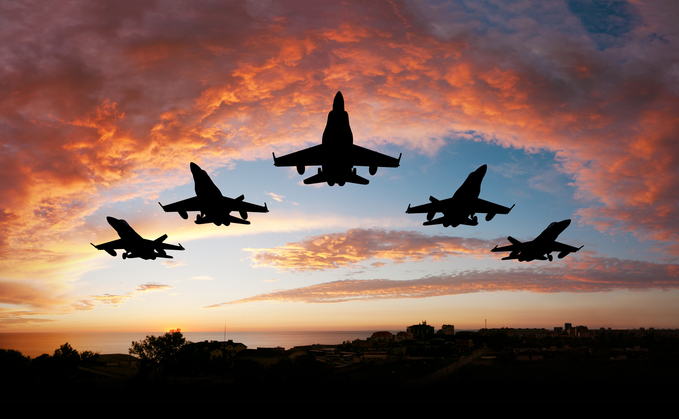
Last Thursday (12 December), Jonathan Reynolds, UK business secretary, met with chief executives from the defence sector in a bid to convince them to "see defence as a core engine of growth".
Investment in defence spending is becoming increasingly "essential", as investors strengthen their stance of favouring and bolstering Western military capabilities following almost three years of war in Ukraine.
Last Thursday (12 December), UK business secretary Jonathan Reynolds met with chief executives from the defence sector in a bid to convince them to "see defence as a core engine of growth".
"Our world-leading defence sector is vital to the economy, supporting thousands of high-skilled, high-paid jobs across the UK," Reynolds told members from the industry. "With our industrial strategy, we are taking the pro-business, pro-growth approach, and the sector needs to drive investment in every part of the country."
Invesco unveils trio of future-focused thematic ETFs
The business secretary's statements came amid mixed signals from investors across continents towards the defence sector.
According to data from Morningstar Direct, the average exposure to aerospace and defence stocks within the Industrials fund category in US stood at 77.5% in the third quarter of 2024, lower than the 80% recorded in the second quarter of this year and below the 83.4% in Q2 2022, shortly after Russia launched a full-scale invasion of Ukraine.
Meanwhile, the Industrial Materials category, which covers Europe, saw its average exposure to aerospace and defence stocks rise from 4.7% in the second quarter of 2022 to 15.9% in the third quarter of 2024.
Hortense Bioy, head of sustainable investing at Morningstar Sustainalytics, said Reynolds' call for investors to be more supportive of defence companies "is in line with EU's efforts to make the defence sector more attractive to the financial sector", which should include not only banks but investors as well.
Investors dispute defence stock overvaluation concerns as military spending grows
"Attitudes toward the defence sector have shifted massively over the last couple of years, mostly because of the Ukraine war," added Michael Field, European equity strategist at Morningstar.
He noted that while initially defence was "lumped in with sin stocks and fossil fuel generators in terms of ethical restrictions", the ethical rationality of the argument was "brought into question" with a war raging on Europe's doorsteps and "Ukraine seen as a European ally under attack".
"The slightly more cynical argument is that the City has been motivated to invest by the performance of the sector, with returns of close to 40% in the last 12 months alone," Field continued. "We also do not believe this is a flash in the plan, with the Ukraine war restocking story expected to take up to a decade for countries like Germany, thus providing a long tailwind for European defence firms."
Among the popular defence strategies in Europe, the Ireland-domiciled VanEck Defense UCITS ETF came out on top with total net assets under management standing at $1.5bn as of 17 December, according to FE fundinfo data.
The strategy, which had 56% of its holdings allocated to the aerospace and defence sector as per Morningstar Direct, had been outperforming its Equity – Other Specialist sector by over 54% in the last 12 months.
IMF warns of market complacency amid heightened geopolitical uncertainty
Roel Houwer, senior product manager at VanEck said Reynolds' remarks last week "align with what we have been hearing from clients: defence is increasingly seen as an essential investment rather than a contentious one".
"The VanEck Defense UCITS ETF has grown to over $1.5bn in AUM since its launch in March 2023, reflecting strong investor demand for exposure to this sector," VanEck's senior product manager argued. "Investor sentiment reflects changing realities—NATO's renewed spending commitments, escalating geopolitical tensions, and the political shift with Trump's return to the White House.
"These developments have reinforced the urgency for nations to prioritise defence spending, both to meet NATO's 2% targets and to address rising security challenges."
Bioy noted that governments and policymakers "can try and influence public opinion, but they cannot dictate investors' values and preferences" when it comes to defence spending.
"Ultimately, excluding weapons from an investment portfolio is an investor's own decision," she highlighted.
Overall, global military expenditure is on the rise, having reached $2.4trn in 2023, according to a report published by the Stockholm International Peace Research Institute.
The US and China remained the top military spenders globally last year, with Beijing trailing Washington's $916bn defence budget by a significant margin ($296bn).
Circe Invest's Fiona Frick: Markets' 'trinity tango' intensifies as Trump returns
Alec Cutler, manager of the Orbis OEIC Global Balanced and Global Cautious funds, said defence contractors "are somewhat like insurance companies".
"They can be disliked or ignored until such time as they are desperately needed but unable to help," he remarked, adding that government spending on defence systems has a multiplier effect.
"All of the defence and aerospace holdings' share prices are up considerably since purchase, off a very depressed base; however, for many, their earnings power has increased apace," Cutler added.
The strategies he manages, mentioned above, continue to hold material exposure to the defence and aerospace sector and were "crafted between the two Russian invasions of Ukraine, during the period of peak ESG misunderstanding of the sector".
The "real question", Cutler raised, was "how can the UK and Europe not increase defence spending?".
"After decades of underinvestment, the insurance policy for freedom that is deterrence through strength has long since lapsed," Cutler continued. "Just two years of supporting Ukraine has emptied the armouries of some of the most critical equipment and ammunition."
Andrew Ye, investment strategist at Global X ETFs, pointed to recent political developments and current geopolitical tensions, which are set to further bolster investment, as NATO members met last week to discuss stepping up their GDP contributions target to defence from 2% to 3%.
According to Ye, the European rise in defence spending could benefit both defence technology companies and businesses within the advanced military systems sector.
Field noted: "The UK government has previously committed to getting defence spending up to 3%, which will ultimately drive defence order books even higher if indeed the government can find the cash to do so."

















